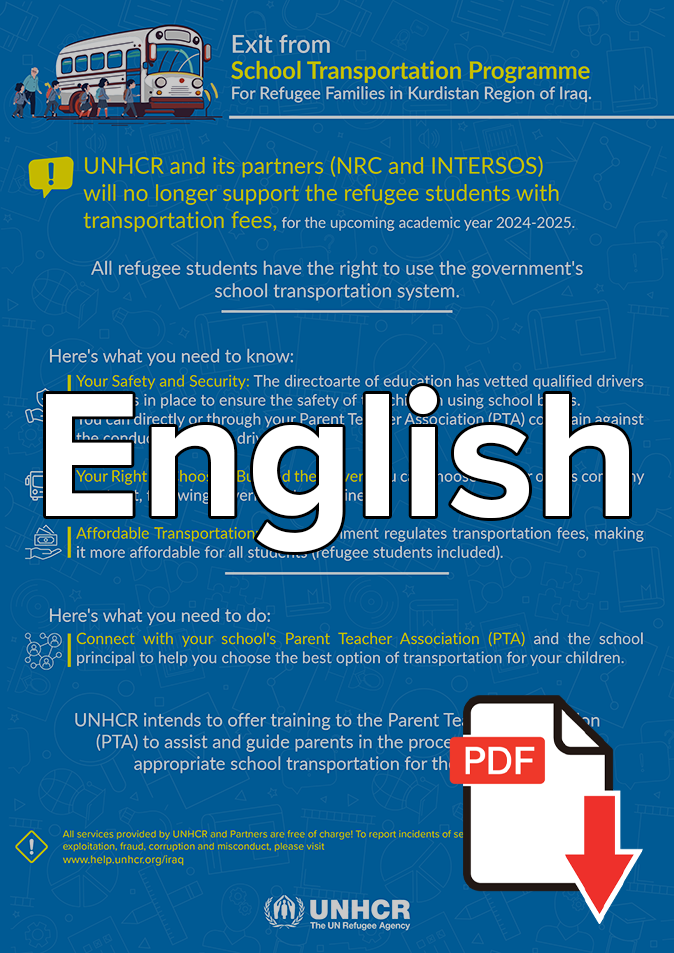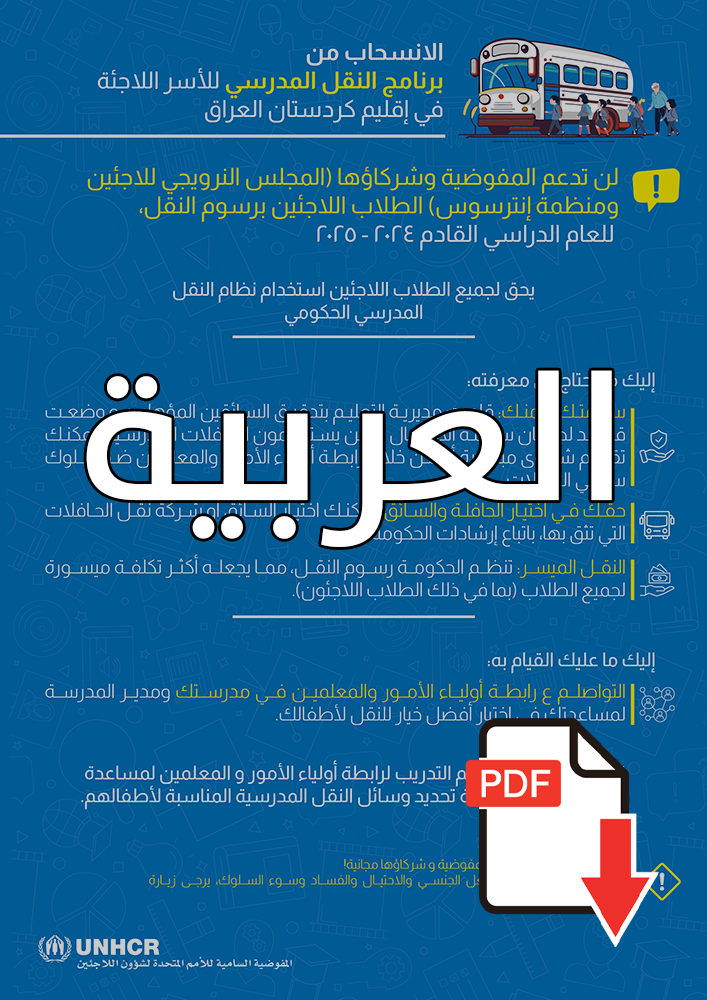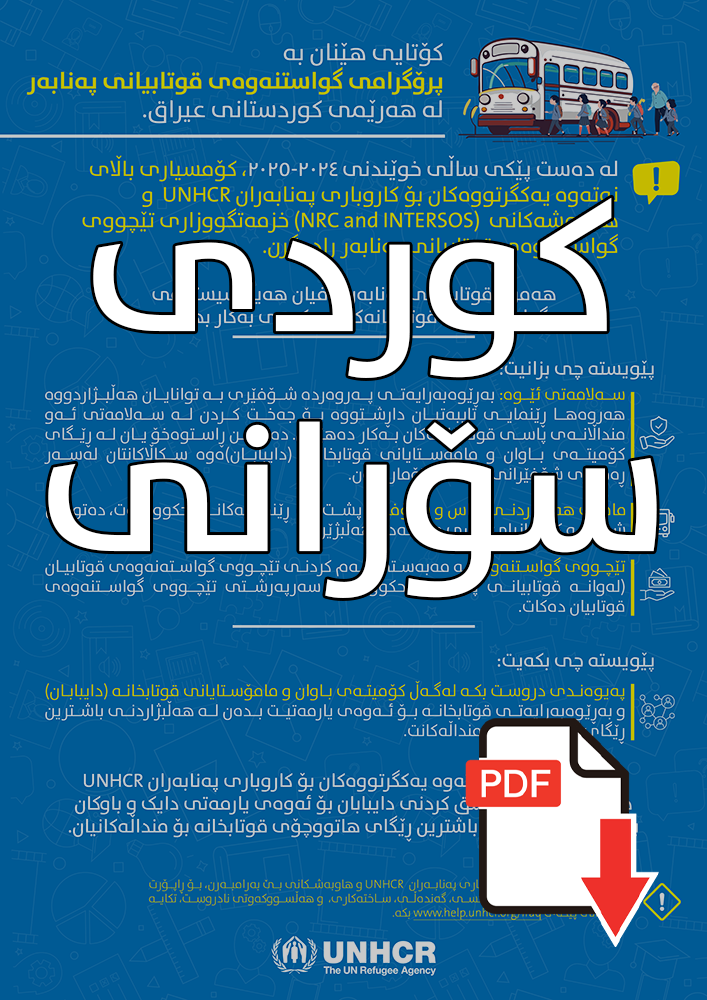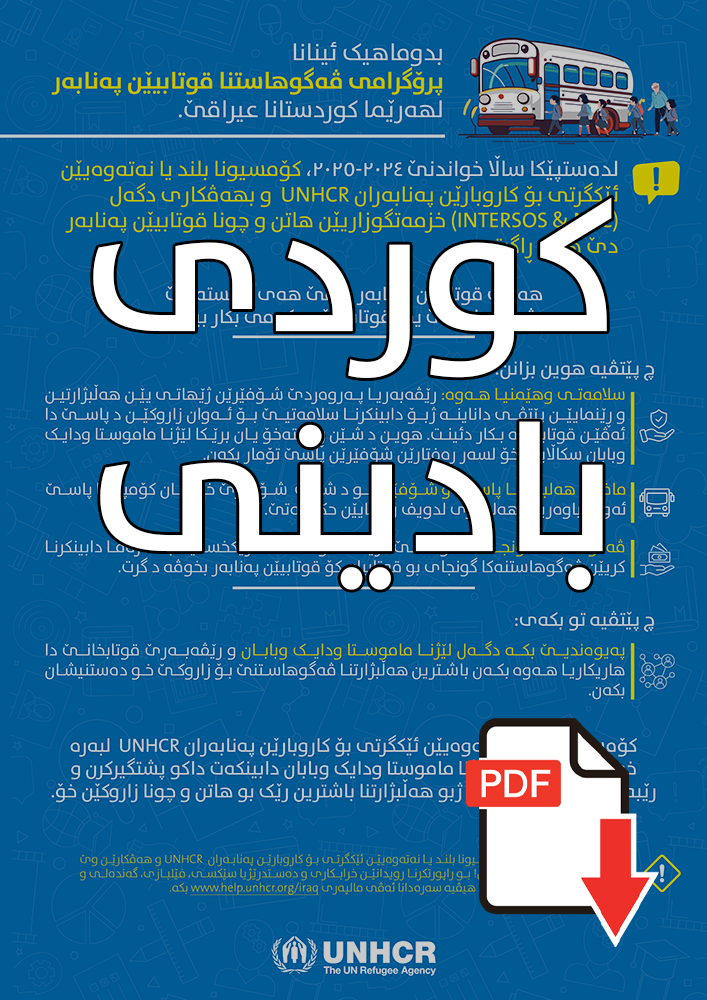Exit From School Transportation Programme
For Refugee Students in Kurdistan Region of Iraq.
UNHCR and its partners (NRC and INTERSOS) will no longer support the refugee students with transportation fees, for the upcoming academic year 2024-2025.
For more information download the flyers below.
Acknowledge that in KRI,
- Refugees are part of the host community.
- UNHCR’s role is to ensure the government meets its obligations for refugee education.
- Education rights are granted, and refugee children are treated equally in the host community. It is important to convey that, unlike in some countries, in KRI, refugee children have equal access to quality education, which is a basic human right.
Acknowledge the community’s role,
- It is important to emphasize that parents, the wider community, and Parent-Teacher Associations (PTAs) are responsible for ensuring all children enjoy their right to education.
Address the reason for the school transportation program termination. Explain that the termination is to ensure refugees have equal access to the programs available for the host community.
Make references to the focus group discussion conducted in May, to remind the community that the decision was made through a participatory process involving affected parents, self-organized parents, government education officials, PTAs, and school principals. This process ensured broad input, risk assessment, and exploration of alternative solutions.
Refer to the key messages and frequently asked questions for further details. Encourage participants to raise any new questions and include them in the provided matrix.
Key Messages
Know your rights.
Education is a basic human right, enshrined in the 1989 Convention on the Rights of the Child and the 1951 Refugee Convention. Education protects refugee children and youth from forced recruitment into armed groups, child labor, sexual exploitation, and child marriage. Education also strengthens community resilience.
Know your duty bearer.
Through the Refugee Education Integration Policy, the Kurdistan Regional Government is a duty bearer and honors to ensure refugee children access to education. Parents must understand that the role of UNHCR (United Nations High Commissioner for Refugees) is to ensure that the government meets this commitment through continued advocacy.
Know your role as a duty bearer.
It is important to underscore that parents, teachers, members of parent-teacher association, and adult members of the community are equally duty bearers to ensure every child enjoys their right to education. As a parent, you have a special duty to ensure your child enjoys their right to education. Kurdistan Regional Government’s generosity is unique as many children in the region are unable to receive basic education for their children.
You are an equal member of your host community.
The Refugee Education Integration Policy in Kurdistan applies to refugees and host community members, ensuring that your children attend the same classroom as host community children and learn from host and refugee teachers. As equal members of society, refugee parents should access public services as host communities and adopt similar coping mechanisms.
Know the rationale behind the termination of the school transportation.
The school transportation programme supported only refugee children. It was initially enacted as inclusive education for refugees and the host community was not in place. Please remember that the Refugee Education Integration Policy includes refugees in all facets of education policies of the Ministry of Education and its Departments. The Government has put in place school transportation committees at each governorate which enables schools, school principals, and host community parents to choose their driver of choice. Refugee parents, as members of their communities, are included in this mechanism – enabling them to access the same public service on equal feet with host communities.
Know about the decision-making process. UNHCR Iraq has engaged in participatory consultations with members of your host and refugee communities, your parent-teacher association, the general directorate of education, and partners. UNHCR has taken your concerns ensuring they are explored with your school principals, your PTAs, implementing partners, and the Government officials – all of these informed the decision to cease the school transportation programme.
Frequently Asked Questions:
We understand that you may have questions about the changes. You may also have some concerns as were raised by your fellow refugees and host community members during the participatory discussion. The Frequently Asked Questions below are intended to provide you with some answers. You are encouraged to raise it if you have more questions during this information session or simply channel it through your parent teacher association, our partners or through our feedback and suggestions channels at our community support centers.
The Directorate of Education (DoE) in each governorate regulates school transportation. It is important to underscore that the Department does not have its own school bus. However, they set standards for bus security and drivers’ clearance and establish standard pricing.
Here are several ways to find alternative transportation:
Check with Your School Principal: Ask if there is an existing bus route that serves your area.
Work with the Parent Teacher Association (PTA): The PTA can help connect you with other parents in similar situations. Together, you can approach the school principal to recommend a vetted driver.
Organize with Other Parents: Collaborate with both host and refugee parents to request a vetted driver from the school principal. You can also ask the principal to help vet a driver you and your community members choose. Remember, your collaboration with your fellow parents in your community with similar situations empowers your community at large – lead the solutions that suit you and community members.
Contact UNHCR Partners: If you want to keep your current driver, you and other parents can reach out to UNHCR partners. Note that school buses are leased from private companies, not owned by UNHCR or its partners. You can work with your community to try to retain the bus service.
The cost of school transportation depends on where you are and how far the school is. The government sets transportation fees to keep them affordable for everyone, including refugee students.
The DoE and school management monitor bus drivers for delays and challenges. Trusted and familiar drivers are being selected, and the DoE has monitoring and a complaint mechanism in place to address any issues.
To help families with multiple children on the same bus, with ongoing recommendations to lower costs. Additionally, there are suggestions to consider reducing fees during holidays when the buses are not in use.
To ensure the safety of school buses, the Department of Education and other authorities have implemented several important measures:
Driver Regulations: Drivers must follow strict rules and traffic regulations. They undergo background checks and must meet specific conduct standards before being approved for public school bus driving.
Pricing Standards: There are set pricing standards for how much school bus services can charge.
Driver Contracts: Schools coordinate with drivers and manage contracts to ensure proper vetting and safety.
Complaint Handling: A dedicated Legal Affairs division handles complaint about driver misconduct. These complaints are reviewed, and corrective actions are taken if necessary.
If you have a complaint about a driver’s conduct, you can report it to your Parent Teacher Association (PTA) or directly to your school principal. The PTA work closely with the education authorities in your area, so they can help channel your concerns with authorities. Be sure to get to know your PTA members and ask for their advice if needed.
You can also send your concerns to UNHCR’s education partners, NRC (Norwegian Refugee Council) and INTERSOS. Here are some ways to raise your complaints:
Use the Complaint and Feedback Boxes located at Community Support Centers.
Visit an Information Feedback Point or Help Desk in person.
Speak directly to UNHCR or partner staff at your nearest Community Support Center




